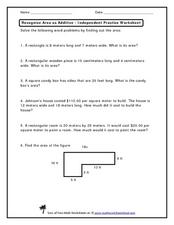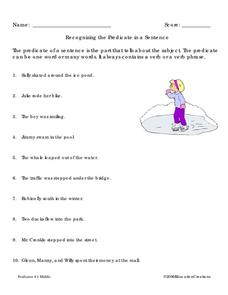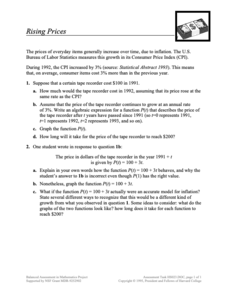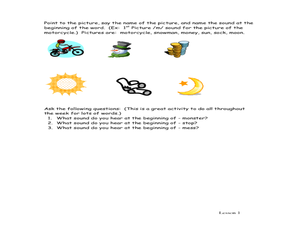Curated OER
Counting Money
In this counting money learning exercise, students recognize coins and their values. Students are given several coins in each of the ten problems and are to determine the value of each set of coins.
Math Worksheets Land
Recognize Area as Additive - Independent Practice Worksheet
Activate your geometer's minds with area calculations, some of which are tricky. First, they solve five word problems dealing only with rectangular shapes. The next five use irregular shapes with side measurements given. Scholars solve...
Curated OER
Making Money Amounts
In this recognizing ways to make the given amounts of money worksheet, students read the total amounts of change and fill in the columns telling the numbers of pennies, nickels, dimes, and quarters needed. Students solve 10 problems.
Curated OER
Canadian Coins 4
In this online interactive Canadian coins worksheet, students answer 6 multiple choice questions about the names of Canadian coins. Students may submit their answers to be scored.
Curated OER
Rounding to the Nearest Whole Number
Bring money and measurement together by practicing rounding decimals to the nearest whole number. Three sections prompt fourth graders to round to the nearest dollar, the nearest meter, and the nearest whole unit. Use this activity as an...
Curated OER
Rounding Decimals, from Hundredths Place to Whole Numbers
An efficient and straightforward decimals learning exercise! Young learners round amounts of money and measurements to the nearest dollar or meter. Each section contains 20 problems, making it easy to divide up this asignment into...
Curated OER
Match the Coins
In this recognizing the values of coins worksheet, learners match the coins with their cent values. Students solve six problems.
Curated OER
Money Amounts to fifty Cents
In this recognizing coin values worksheet, students count pennies, nickels, dimes, and quarters to fifty cents. Students solve 10 problems.
Curated OER
My Foot and the Standard Foot
Young mathematicians put one foot in front of the other as they learn how to measure length in an elementary math lesson. Using paper cutouts of their own feet, children measure classroom objects as they discover the importance of...
Curated OER
Identify Coins Worksheet (b/w)
In this coin identification worksheet, students look at the pictures of the coins on the left and the names of the coins on the right. Students draw a line to match the 4 coins to their name.
Curated OER
Identify Coins Worksheet (color)
For this coin identification worksheet, students look at the pictures of the coins on the left and the names of the coins on the right. Students draw a line to match the 4 coins to their name.
Curated OER
Math--Recognizing and Matching Numbers
In this recognizing and matching numbers instructional activity, students draw a circle around the bunnies from each hutch and then draw a line from the bunnies to the hutches to show where they belong. Students fill in the missing...
Curated OER
Recognizing the Predicate in a Sentence
In this grammar worksheet, learners will learn how to find the predicate in a sentence. Then students will find and circle 10 predicates in different sentences.
Curated OER
Money Counting Worksheet
In this counting money worksheet, students study the coins in each of 4 rows and count the amount of money they total. Students write the total amount.
Curated OER
Money Counting Worksheet
In this counting coins learning exercise, students look at the coins in each row, total their amount, and write their total in the blank.
ProCon
Gold Standard
If all the mined gold in the world was melted across a football field, it would rise 5.4 feet. That's just one interesting fact pupils learn when using the debate topics website to determine if the United States should return to a gold...
Concord Consortium
Rising Prices
What will that cost in the future? The scenario provides pupils with a growth as a Consumer Price Index. Learners create functions for a given item to determine future prices and graph them. Class members then compare their functions to...
Curated OER
To, Too, or Two
Illuminate the difference between to, too, and two with this worksheet. For this activity, learners complete each sentence correctly by filling in each blank with either to, too, or two. After they fill in all twelve blanks, they write...
Curated OER
Multiply by Two-Digit Numbers
In this multiplication worksheet, students solve 13 problems in which dollars and cents or 3 digit numbers are multiplied by 2 digits. Students will need to rewrite some of the problems.
Curated OER
Compound Interest Problem
In this compound interest activity, students solve 1 word problem about compound interest. Students determine the amount of money two men have to retire given two different saving scenarios.
Curated OER
Expressions
In this recognizing correct grammar in sentences worksheet, learners read incomplete sentences, use context clues, and choose the correct verb to complete the sentences. Students answer 10 multiple choice questions and click the Answer...
Curated OER
Coffee Houses
In this online/interactive recognizing vocabulary usage worksheet, students use the words and phrases bank to fill in the blanks and complete the sentences. Students write 10 answers.
Curated OER
Letter Recognition and Letter Sounds
In this letter recognition worksheet, learners name and practice the letter sounds "M" and "S." Students practice saying several words that begin with the letter "M."
EngageNY
Why Do Banks Pay YOU to Provide Their Services?
How does a bank make money? That is the question at the based of a lesson that explores the methods banks use to calculate interest. Groups compare the linear simple interest pattern with the exponential compound interest pattern.























